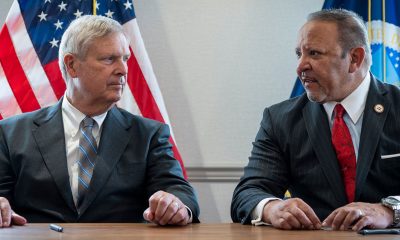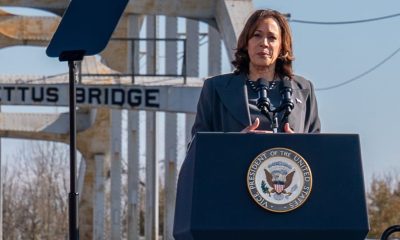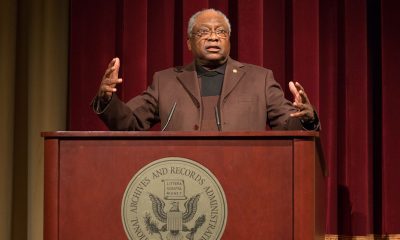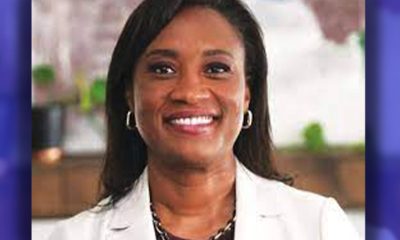News
OP-ED: Will South Carolina Become a Leader of the New South?
On Friday, the Confederate battle flag came down on the South Carolina Statehouse grounds. This symbolic, long overdue gesture has significant meaning. The flag celebrated the sedition, slavery and secession of the Civil War.
When Robert E. Lee surrendered, that flag was furled. It was raised over the statehouse in 1961 to celebrate segregation, suppression and states’ rights. Previous efforts to remove it failed.
Former Gov. David Beasley called for it to come down, and probably lost his re-election as a result. Even after the triumph of the Civil Rights Movement, South Carolina burnished this symbol of racial division.
This symbolic victory came in the wake of bloodshed: the murders of the Emanuel Nine, brutally slain while in church at a prayer meeting. It came because of the amazing grace of the relatives of the slain, offering forgiveness to the hateful killer who shot the nine in cold blood.
It came because of the leadership and courage of the governor, Nikki Haley, who stood up and spoke out in the wake of the horror, calling on the legislature to take the flag down.
It came because of the pressure of the Chamber of Commerce and business leaders — from Boeing, Volkswagen and others — making it clear that they would find it difficult to invest in a South Carolina still intent on honoring this symbol of racial division.
The question now is whether South Carolina can discard not just the symbol of the flag but also the substance of the flag’s agenda. Can the governor now grasp this moment to lead in resurrecting the South?
Bringing down the flag has opened the way. The NCAA lifted its ban on post-season championship events in South Carolina, a decision that could produce millions in tourist revenue.
New investments are likely to go forward now that the flag is down. Last month, Gov. Haley signed into law a bill requiring police to wear body cameras, putting the state in the national leadership on that issue. But much more needs to be done.
South Carolina is one of the states that chose to reject the expansion of Medicaid offered by Patient Protection and Affordable Care Act, even though the federal government would pick up virtually all of the expense.
It turned its back on $12 billion over the next five years, money that its hospitals and health system desperately needs. It deprived over 160,000 of its working people, more whites than blacks, from getting health insurance. Surely this is the time to reverse that decision.
South Carolina has joined other Southern states in erecting voter ID laws designed to make voting more difficult, with disproportionate impact on the elderly, people of color and the poor. This too was discriminatory in effect and in intent.
The more extreme North Carolina law is now being challenged in the Supreme Court. South Carolina could lead the South in reforming its laws to ease registration and voting rather than restricting it. South Carolina’s Republican representatives in Congress tend to support their party’s assault on public investment.
The U.S. Army Corps of Engineers has just announced that it plans to go forward with a project to deepen the port at Charleston. South Carolina will benefit greatly if the ports at Charleston and Jasper are able to handle the larger modern container ships.
As the state benefits from federal investment in its ports, surely it is time for its representatives to push for greater public investment in infrastructure, and not continue to starve it.
Gov. Haley could be the determining force. She has focused on jobs, driving an agenda designed to make South Carolina attractive to business.
She has demonstrated leadership in regard to the flag. She’s announced her commitment to save South Carolina State University, a historically black college, appointing a new board to help dig it out of the hole it is in.
She has earned the good will of the vast majority of South Carolina citizens and businesses. Now she can turn that authority to making South Carolina a leader of the new South.
Activism
Oakland Post: Week of April 17 – 23, 2024
The printed Weekly Edition of the Oakland Post: Week of April 17 – 23, 2024

To enlarge your view of this issue, use the slider, magnifying glass icon or full page icon in the lower right corner of the browser window. ![]()
California Black Media
Yahushua’s Law: Senate Advances Bill to Protect Students from Extreme Weather
In a significant move towards student safety, the California Senate Education Committee passed Senate Bill (SB) 1248, also known as Yahushua’s Law, on April 3. The bill is named in memory of Yahushua Robinson, a 12-year-old student from Lake Elsinore, who tragically died due to a heat-related illness during a physical education class in 2023. It is a pioneering effort to prevent similar incidents in the future.

By California Black Media
In a significant move towards student safety, the California Senate Education Committee passed Senate Bill (SB) 1248, also known as Yahushua’s Law, on April 3.
The bill is named in memory of Yahushua Robinson, a 12-year-old student from Lake Elsinore, who tragically died due to a heat-related illness during a physical education class in 2023. It is a pioneering effort to prevent similar incidents in the future.
Authored by Senator Melissa Hurtado (D-Bakersfield) and co-authored by Assemblymember Akilah Weber, M.D. (D-La Mesa), SB 1248 directs the California Department of Education to develop comprehensive guidelines for schools regarding student activity during all extreme weather conditions.
“No student should ever lose their life on campus to extreme weather when we can take steps to protect them by preparing statewide plans to minimize exposure to the most harmful elements of exposure,” Hurtado said after introducing SB 1248.
The bill stipulates that schools must implement safety measures which include monitoring weather forecasts, postponing or relocating outdoor activities during hazardous conditions, and ensuring students have proper hydration and access to shade. It also requires schools to establish clear communication plans to keep parents, teachers, and students informed about potential weather hazards.
Supporters of the bill include the Robinson family, advocate Christina Laster, Bold Enterprises LLC, California Black Women’s Collective Empowerment Institute, Familias Empoderadas del Valle Central National Action Network, The Black Student Advocate, and the Ventura County Alumnae Chapter of Delta Sigma Theta Sorority.
Thanking Hurtado for introducing this crucial legislation, Weber said, “The story of Yahushua Robinson last year was heartbreaking. We have protections for farm workers and other industries in the case of extreme weather, now climate change is forcing us to also extend similar protections to students at school.”
Barbara Lee
Congresswoman Barbara Lee Issues Statement on Deaths of Humanitarian Aid Volunteers in Gaza
On April 2, a day after an Israeli airstrike erroneously killed seven employees of World Central Kitchen (WCK), a humanitarian organization delivering aid in the Gaza Strip, a statement was release by Rep. Barbara Lee (D-CA-12). “This is a devastating and avoidable tragedy. My prayers go to the families and loved ones of the selfless members of the World Central Kitchen team whose lives were lost,” said Lee.

By California Black Media
On April 2, a day after an Israeli airstrike erroneously killed seven employees of World Central Kitchen (WCK), a humanitarian organization delivering aid in the Gaza Strip, a statement was release by Rep. Barbara Lee (D-CA-12).
“This is a devastating and avoidable tragedy. My prayers go to the families and loved ones of the selfless members of the World Central Kitchen team whose lives were lost,” said Lee.
The same day, it was confirmed by the organization that the humanitarian aid volunteers were killed in a strike carried out by Israel Defense Forces (IDF). Prior to the incident, members of the team had been travelling in two armored vehicles marked with the WCF logo and they had been coordinating their movements with the IDF. The group had successfully delivered 10 tons of humanitarian food in a deconflicted zone when its convoy was struck.
“This is not only an attack against WCK. This is an attack on humanitarian organizations showing up in the direst situations where food is being used as a weapon of war. This is unforgivable,” said Erin Gore, chief executive officer of World Central Kitchen.
The seven victims included a U.S. citizen as well as others from Australia, Poland, the United Kingdom, Canada, and Palestine.
Lee has been a vocal advocate for a ceasefire in Gaza and has supported actions by President Joe Biden to airdrop humanitarian aid in the area.
“Far too many civilians have lost their lives as a result of Benjamin Netanyahu’s reprehensible military offensive. The U.S. must join with our allies and demand an immediate, permanent ceasefire – it’s long overdue,” Lee said.
-

 Activism4 weeks ago
Activism4 weeks agoOakland Post: Week of March 20 – 26, 2024
-

 #NNPA BlackPress3 weeks ago
#NNPA BlackPress3 weeks agoCOMMENTARY: D.C. Crime Bill Fails to Address Root Causes of Violence and Incarceration
-

 #NNPA BlackPress4 weeks ago
#NNPA BlackPress4 weeks agoFrom Raids to Revelations: The Dark Turn in Sean ‘Diddy’ Combs’ Saga
-

 #NNPA BlackPress3 weeks ago
#NNPA BlackPress3 weeks agoMayor, City Council President React to May 31 Closing of Birmingham-Southern College
-

 #NNPA BlackPress4 weeks ago
#NNPA BlackPress4 weeks agoCOMMENTARY: Lady Day and The Lights!
-

 Activism3 weeks ago
Activism3 weeks agoOakland Post: Week of March 27 – April 2, 2024
-

 #NNPA BlackPress4 weeks ago
#NNPA BlackPress4 weeks agoBaltimore Key Bridge Catastrophe: A City’s Heartbreak and a Nation’s Alarm
-

 #NNPA BlackPress4 weeks ago
#NNPA BlackPress4 weeks agoBaltimore’s Key Bridge Struck by Ship, Collapses into Water




















































